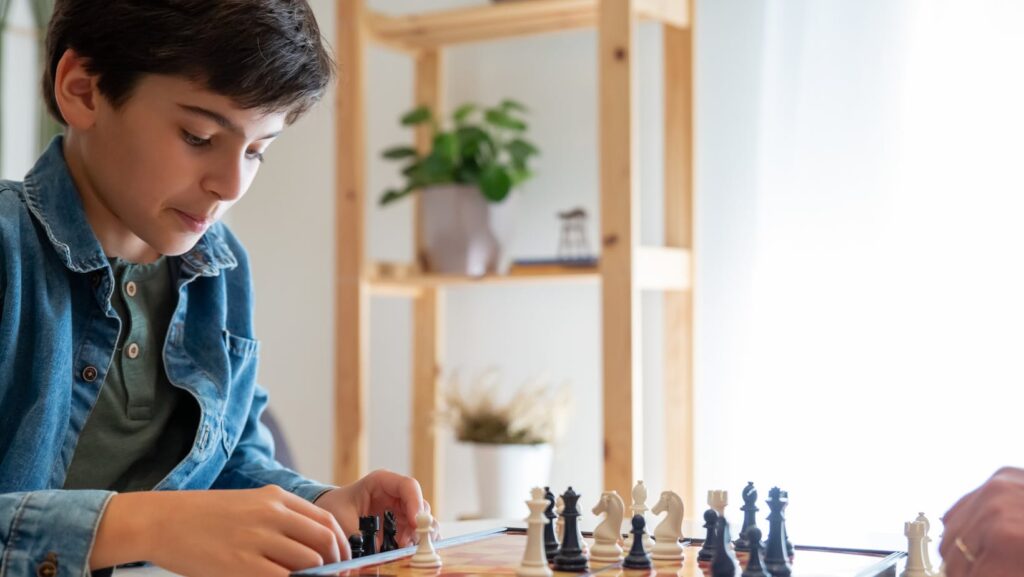Chess, often referred to as the game of kings, is more than just a simple board game. It’s a battle of wits, a test of strategy, and a challenge that stretches the mind to its limits. But is chess strategic.
Is Chess Strategic

Chess, globally recognized as a strategic mind game, demands players to employ tactics and plans. The power and performance on the 64-square battlefield constitute a test of foresight, acumen, and tactical understanding.
In chess, planning plays a pivotal role. For instance, grandmasters analyze different setups before executing a move, constantly calculating potential outcomes. It’s not about the next move, but about understanding the flow of the game, setting a broad course towards the endgame. Chess involves using tactics such as forks, pins, and skewers. These techniques, when employed correctly, disrupt the opponent’s game plan, forcing them to react rather than dictate the game’s pace.
Key Strategic Elements in Chess
Opening Strategies
Optimized opening strategies in chess set the tone for the game. They involve the broader deployment of pieces, creating a protective arsenal around the King, while also enabling control of the board’s center. For example, techniques like the Sicilian Defense, French Defense, and Caro-Kann Defense showcase tactical moves that focus on strategic placement initially. Making the right decisions early, sets the pace, providing a tactical edge.
Middle Game Tactics

Middle game tactics focus on positioning, where players aim to optimize their pieces’ locations, while also devising potential attacks. The key focus lies in controlling the board, attempting to gain an advantage while limiting the opponent’s maneuverability. Examples include the fork, where a single piece threatens two or more of the opponent’s pieces, the skewer, similar to the fork but reverses the order of attack, and the pin, whereby an opponent’s piece is held stationary due to line of attack.
Endgame Strategies
Endgame strategies carry equal importance as early and middle-game plans. These maneuvers seem tricky, as they often come down to a game of pawns and kings. For example, the King’s Centralization is a strategy where the king moves toward the center of the board to obtain a positional advantage. Overall, the significant aspects of endgame strategies revolve around apt planning, and understanding of pawn structures, and exploiting these to promote a pawn to a queen, giving life to a lethal strategy.
Enhancing Strategic Thinking Through Chess
Educational Benefits of Learning Chess
Incorporating the game of chess into educational environments, displays multiple advantages. Chess nurtures fair play, discipline and enhances strategic thought. It acts as a catalyst, driving students to ponder, devise and implement strategies, mirroring real-life decision-making. Studies cite chess as a successful tool in boosting memory and computational skills in individuals.
For example, a statistical study in 2000 displayed improvement in academic performance of students participating in chess clubs, revealing a raise in math and reading scores by up to 17.3%. Thus, reinforcing the claim that chess enhances strategic thinking and ignites intellectual abilities.
Chess as a Tool for Cognitive Development

Chess goes beyond being just an intellectual pastime. It plays a significant role in cognitive development, nurturing critical thinking abilities and bolstering problem-solving skills. It demands a comprehensive understanding of tactical gameplay while promoting logical reasoning and fostering discipline among players.
Overall, chess trains the mind to analyze situations intricately, contemplate different outcomes, and enact decisions tactically. This answers the question, is chess strategic. Furthermore, research indicates that elderly individuals who partake in games like chess present a demonstrably lower risk of developing symptoms of dementia.
A Strategic Journey and Educational Tool
Is chess strategic, Chess isn’t just a game; it’s a strategic journey that stretches the mind and nurtures life skills. It demands foresight, planning, and adaptability, mirroring real-life decision-making. With its intricate opening moves, middle game tactics, and endgame strategies, chess is a masterclass in strategic thought. Beyond the board, it’s a powerful educational tool, fostering fair play, discipline, and cognitive development.

